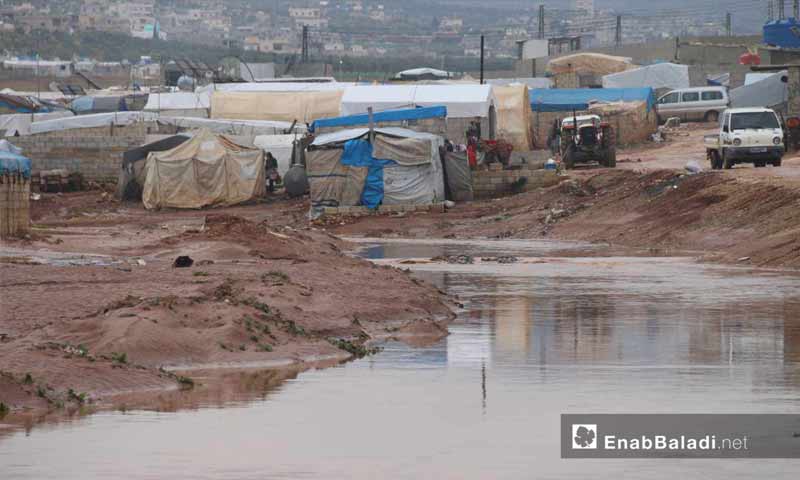



Pictures of displacement camps, flooded by heavy rain and deluges, and scenes of children shivering with cold take over social media every winter, accompanied by a frenzy of campaigns calling for providing assistance and making utmost efforts to help the internally displaced persons (IDPs), coerced into escaping their homes as a result of violence that never stopped since 2011.
However, this year’s Idlib does not bear any similarity to the province of earlier years, for its camps are overcrowded with unprecedented numbers of IDPs in the aftermath of military campaigns on the southern countryside of Idlib and the northern Hama countryside since February 2019, which triggered the displacement of one million persons according to the Syria Response Coordination Group (SRCG).
The Director of the SRCG, Mohamed Hallaj, told Enab Baladi that the number of IDPs camps in Idlib has risen from 1,041 formal and random camps, housing 726,000 civilians, to 1,132 camps, where the total number of IDPs exceeded 922,000 persons.
The continuation of the regime’s campaign means an increasing number of IDPs, which are putting pressure on the camps, already suffering the lack of services, Hallaj added.
Mohamed Hallaj warned that neglecting the current state of random camps would effect a problem since most of these camps are built on agricultural lands, which necessitate action aimed at organization and paving the roads leading to these camps. Besides, the floors of camps’ tents are urgently in need for insulation and adequate sanitation services to prevent the prevalence of diseases among children and old people in particular, which 90% of the camps lack.
He pointed out that the camps’ accommodation always experiences deficiencies, as projects for accommodating and insulating tents have had to be done earlier since the end of last winter. Nonetheless, the organizations, this year, have only made modest and disparate efforts, emphasizing that all parties did not adopt the proposed protection methods, such as digging trenches, which must surround the entire camps and each tent to ensure the continuous drainage of rainwater.
For its part, the Salvation Government, in control of Idlib, has proposed many road construction projects, which are to facilitate work in the winter, in addition to drainage, tent insulation and heating projects, “urgently appealing” to the organizations and “recommending” that immediate action be taken before winter, as the Director of the Camp Affairs Directorate at the Ministry of Development, Khalid al-Omar, told Enab Baladi.
The Directorate of the Camp Affairs’ role, al-Omar pointed out, is to “coordinate” between the organizations, adding that the it has addressed the issue of informal camps “informing all the directorate’s departments of the need to conduct follow up of the camps, ensure they are covered by the directorate and in accordance with its regulations, seeking to foster camps with services, following an assessment of their numbers and most urgent needs, and then calling the organizations to their help.”
Al-Omar clarified that the main problem facing the camps is that they have been set up a long time ago, over seven years, in addition to being established in areas of rugged nature, such as valleys or slopes of mountains in the riverbeds.
“The families’ insistence on staying in the same location despite being proposed to be transported to mountainous terrains which cannot be affected by the winter is one of the biggest problems,” he said, adding that “but still, we cooperated with a number of organizations on preventative projects in these camps, such as road rehabilitation and construction, for facilitating the flow of the winter rains .”
However, the United Nations Office for the Coordination of Humanitarian Affairs (OCHA) demonstrates that the overcrowdedness of the camps and the need to replace damaged tents are the top challenges, given the difficulty at finding appropriate lands to set up or expand camps.
Additionally, OCHA pointed out to the acute funding shortfalls, for up to August 22 it received only 28% of the funding requested for 2019, adding that Syria Cross-border Humanitarian Fund has allocated $22.5 million for the humanitarian response.
The Fund requested $29 million for the implementation of 45 projects by the 33 partner organizations operating in the region. The report, issued on August 23, added that the United Nations has designated 12,497 new tents for the camps, of which 9929 tents have been delivered to the date the report was published.
if you think the article contain wrong information or you have additional details Send Correction